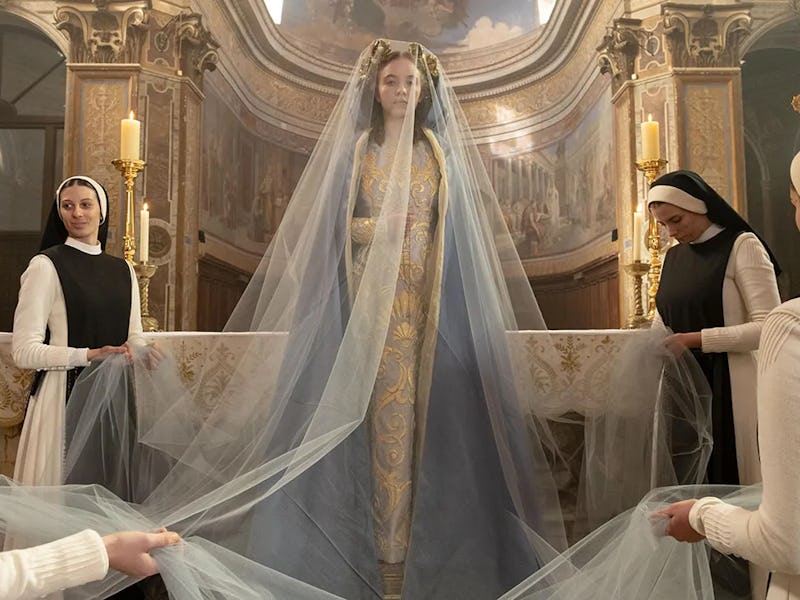Immaculate Is the Loudest Horror Movie You’ve Ever Heard
The movie’s good ideas fall victim to overbearing horror filmmaking.

Things go bump and clang in the night in an Italian convent, in which American newcomer Sister Cecilia (Sydney Sweeney) ends up suddenly and miraculously pregnant in Michael Mohan’s eerie but overbearing Immaculate. But the more she snoops around, the more she realizes something sinister is afoot. Unfortunately, it takes until the final act for the horror movie to lay its cards on the table, at which point it displays mild hints of intensity. In order to get there, however, Immaculate first throws every cheap and familiar aesthetic trick at the wall just so see what sticks, causing one hell of a racket.
A brisk prologue sucks the audience in, with images of a young nun trying to escape the convent’s grounds. Nuns dressed in haunting red masks and some bone-crunching violence make for a fun introduction, but the film is seldom as enjoyable ever again. When it switches focus to Cecilia — whose one-way ticket causes Italian airport officials to worry she’s being exploited — her daytime arrival in the countryside is met with aggressive, unsettling interactions from the convent’s Mother Superior (Dora Romano) and her translator Sister Mary (Simona Tabasco), who warns her not to romanticize the lush setting, with its centuries-old abbey. Things aren’t easy for young newcomers, since their job is to look after aging nuns living out their last days. Death is in the air.
From there on out, each sunset at the convent is followed by some creepy instance pulled from the book of basic horror tropes, from old women with dementia to ghostly shapes moving in the darkness to cult-like rituals hidden away in the abbey’s secret corners, which Cecilia explores as as though it were her routine. There’s little causality between these tonally disparate happenings — which feel plucked from different horror subgenres, from ghost to exorcism to nunsploitation — and no commonality other than Cecilia’s presence. When the film finally reveals the breadth of its plot, it turns out very few of them were connected to what’s really going on. The abbey just happens to be older than any building the American newcomer has ever stood inside, and its door hinges creak at a comically loud volume, making it difficult (if not impossible) to stay invested as tension builds.
When that tension is finally released, it takes exactly the form you’d expect. Silence is punctuated not by anxious anticipation, but by resignation, as the umpteenth disconnected jump scare approaches. “All right, let’s get it over with,” you might think, before a jarringly edited bit of sensory input — a harsh noise or a flashback to a random, screaming face — startles you without ever being scary. Anytime the camera lands on something truly unsettling, it’s quick to cut away.
Just when Immaculate appears to become truly frightening, it undercuts itself.
Christian symbols and iconography are constantly weaponized, leading to a handful of rousing moments, while historical artifacts, like a metal spike believed to have been recovered from the site of Christ’s crucifixion, bring the weight of history into view. But the holy is never imbued with unholy implications until the curtain is pulled all the way back, near the tail end of the movie’s 90-minute runtime.
Sweeney, however, anchors the movie’s emotional core with commitment and care, as her naïveté turns to worry (and, eventually, to anguish). Cecilia’s sudden pregnancy flips the premise around — where the character was once ignored, she’s now revered, as the bearer of Christ’s second coming — and the film deftly captures some of the anxieties associated with pregnancy, often through its bodily effects on her. By portraying the immense pressures placed on her shoulders, Mohan turns Immaculate into a parable for some of the more discomforting notions within Catholic dogma, from virginal conception to centering a young mother charged with saving the world through biological function.
Immaculate is at its best when it hones in on the unsettling horror of motherhood.
Pregnancy is the scariest thing about Immaculate, but it’s also the only scary thing about it. Even its gestures toward critiquing the patriarchal constraints of religion — by zeroing in on the quiet fanaticism of the convent’s head priest, Father Sal Tedeschi (Álvaro Morte) — are quickly subsumed by filmmaking gimmicks that lay bare just how empty the movie feels beyond the broad strokes of its premise. Not only does it have some of the worst, most overbearingly cacophonous sound design of any recent horror film, but its score by Will Bates confuses “off-key” for unsettling. Coupled with the movie’s many unsuccessful jump scares — more hop-and-skip scares, really — the result is more annoying than engaging.
When the unsettling nature of motherhood is in its crosshairs, Immaculate works like a charm, thanks to some gory practical effects on a scale as small as a fingernail (hint hint). But for the most part, it’s a viscerally irritating movie with few new ideas — until a significant one near the very end, by which point the whole exercise feels too little, too late.